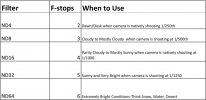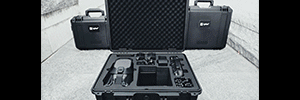I got my Air last year and due to covid only really had a few opportunities to fly it, but the fast shutter speed was definitely an issue in my videos.
Looking to buy some ND filters, I saw that the kits usually go ND 8/16/32, some kits have 64 but also useless polarizing and UV filters. Sadly no one seems to make variable filters. Would 32 be enough to get 1/60 shutter in bright daylight? Or 64, or even higher is necessary?
Theoretically if my normal shutter speed would be 1/1000 in broad daylight (just guessing as it's been cloudy for weeks here) with a 5-stop filter (ND32) the resulting speed would be 1/32 (base shutter speed x 2^n) which should be plenty for motion blur if not for blurring waterfalls in long exposure photos. But I'm curious what's the reality and which filters you're using most often.
Looking to buy some ND filters, I saw that the kits usually go ND 8/16/32, some kits have 64 but also useless polarizing and UV filters. Sadly no one seems to make variable filters. Would 32 be enough to get 1/60 shutter in bright daylight? Or 64, or even higher is necessary?
Theoretically if my normal shutter speed would be 1/1000 in broad daylight (just guessing as it's been cloudy for weeks here) with a 5-stop filter (ND32) the resulting speed would be 1/32 (base shutter speed x 2^n) which should be plenty for motion blur if not for blurring waterfalls in long exposure photos. But I'm curious what's the reality and which filters you're using most often.














